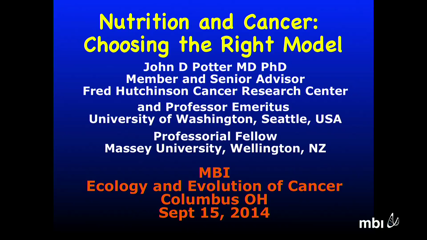MBI Videos
John Potter
-
 John Potter
John PotterIn the light of known associations between cancer and specifically: alcohol; dietary fat; obesity; vegetables, fruit, and single nutrients; hormones; and inflammation, I will make the case that the dominant theory of carcinogenesis does not do a very good job of underpinning widespread coherent epidemiologic findings.
The talk will begin with the dominant theory of carcinogenesis. What we know about some nutritional/lifestyle causes of cancer (with occasional asides on anomalies and policy implications) will follow. I will make the case that the empirical findings and the theory are ill-matched but, also, that there are other theories that can help us think more clearly about diet and cancer particularly. From this point, the talk will focus on insights from development and morphogenesis – invoking clear evidence for the capacity of developing organisms to respond to environmentally generated signals and to modify their development accordingly. Noting that an important universal (but often ignored) characteristic of cancer is disrupted tissue microarchitecture, I will suggest that we can consider cancer as something like disordered development and will discuss the role of morphostats in its genesis; analogous to agents that shape developing organisms (morphogens), morphostats are agents that maintain adult tissues. I will then ask the crucial mechanistic question as to whether there is any evidence that cells in developing organisms (and, by implication, perhaps cancer cells) can directly read signals from their environment. Indeed, there is evidence that developing cells can sense their systemic and nutritional environment and that exogenous nutrients and endogenous hormones can directly regulate at least one key morphogenetic/morphostatic signaling system and determine cell fate.
Thinking about more appropriate theories of carcinogenesis may allow us to ask better questions in studies of nutrition and lifestyle.
